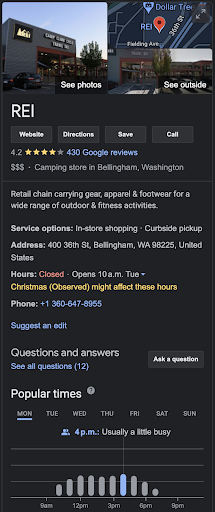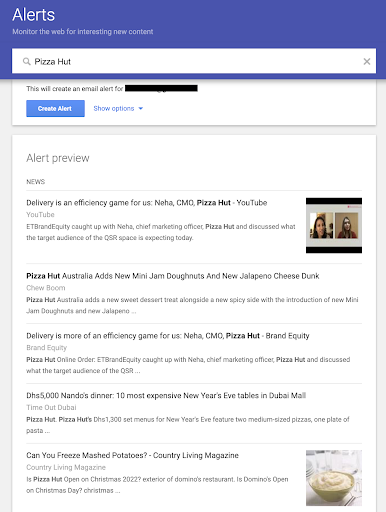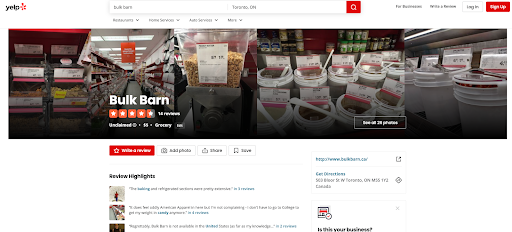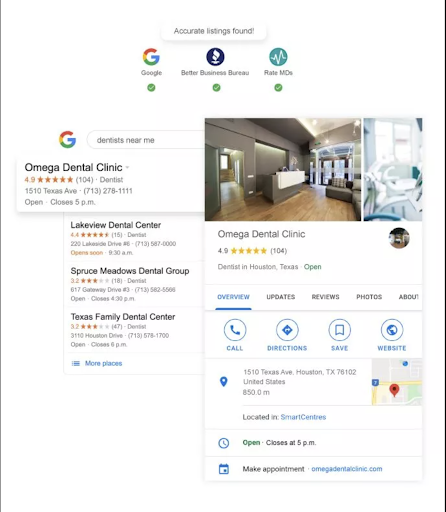How to monitor online reputation for your clients
In our digital age, being in business means your reputation will almost always precede you. That’s why it’s so important to monitor the online reputation of your clients.
Grab our white-label reputation management sales playbook to guide your sales pitch and close more reputation management clients.
Just over half of shoppers today say they regularly research products online to make sure they’re making the best purchase, and that number jumps up to 81% for big purchases of over $500.
The reputation management stats don’t lie: Regardless of what industry your clients operate in, their customers are likely going to develop a strong impression of the brand before even interacting with the business directly. If that impression is negative, it’s unlikely that the prospect will ever convert. Reputation monitoring ensures that when those crucial impressions are made, your clients leave their prospects with the best possible perception.
In this article, we’ll go over what business reputation monitoring entails and how you can offer brand reputation monitoring services to your clients.
What is reputation management, and why does it matter?
Online reputation management refers to the monitoring and management of what others say online about a business. It also encompasses the influencing and growing of positive mentions of a business online.
Business reputation monitoring, on the other hand, is a response to the reality that today’s consumers are empowered to seek third-party information about any business before purchasing products or services. While well-crafted ads and a solid PR strategy may have sufficed in past decades, today’s businesses must recognize that what their customers say about them online is going to be more impactful than any ad copy or well-placed PR blurb.
However, that doesn’t mean that businesses are powerless in the face of consumer sentiment. Online reputation monitoring services make it possible to track reviews and mentions, respond at scale, and take action in the event of negative reviews.
So, why does all this matter?
A single bad review can be enough to dissuade up to 87% of shoppers from purchasing from a business. With the right business reputation monitoring solutions in place, that negative review can become an opportunity to showcase the responsiveness, transparency, and care with which a business treats its clients. Reputation monitoring ensures the negative review isn’t missed and is properly addressed.
Over time, online reputation management monitoring ensures that your clients build a positive reputation.
Types of online reputation monitoring
A business’s online reputation can be impacted by a range of factors. The different types of online reputation monitoring address the different moving parts that can all play a contributing role in a business’s online reputation.
Reviews
Review monitoring is the cornerstone of any effective business reputation monitoring effort. Reviews can be powerfully persuasive since they function as personal recommendations or testimonials for the digital age. In the past, customers could only receive these peer recommendations from friends and family. Today, online reviews from strangers can elicit similar feelings of trust in a product or service.
Review management and monitoring include tracking reviews from different sources, analyzing them at scale to gather actionable data, and responding to them.
Social media
Prospective customers can easily search social media for mentions of a brand, product, or service. Mentions on social media function similarly to reviews. Users are likely to interpret them in much the same way, seeing them as authentic and coming from peers.
Social media reputation monitoring involves the tracking of social media mentions. It empowers businesses to gauge consumer sentiment, take action in the event of negative mentions, and build trust and authority with audiences by being responsive.
Listings management
Online listings, such as Google Business Profile, Yelp, and other directories, play an important and often underrated role in online reputation. Not only is having up-to-date listings important from a local SEO perspective, but it also conveys to consumers that a business is active and engaged.
Listings management tools simplify the management of online listings at scale.
Brand reputation
Brand reputation monitoring takes into account several different types of reputation monitoring to develop an accurate picture of a brand’s reputation overall, both with its customers and within its industry or niche. It typically includes:
- Data from review monitoring
- Data from customer listening
- Competitive data
By incorporating competitive data, businesses can more effectively determine their own goals and benchmarks to help them win a larger share of the market through effective online reputation management.
Free tools to monitor the online reputation of your clients
Luckily, you don’t have to comb through every review site, social media post, or blog entry to monitor the online reputation of clients. There are tools that simplify the process, making it easy to interpret large amounts of data quickly, take action when needed, and develop strategic plans for improving reputation metrics. Let’s take a look at some of them.
1. Google Business Profile (formerly Google My Business)
Having listings across a range of reputable websites is important from both an SEO and a reputation management perspective. However, Google Business Profile deserves special attention, thanks to its prominent position and robust features. These include:
- A question-and-answer section
- Google Business Profile posts, which appear like blog posts on a listing
- Product listings
- Contact information
- Opening hours
- Reviews
Consumers regularly consult Google first before making a purchase or even visiting a brick-and-mortar business. Having an updated and informative profile with lots of reviews can go a long way in driving traffic and conversions.
Consider offering your clients Google Business Profile management services. This would include claiming and completing the listing, adding regular posts to it, and monitoring reviews to gauge reputation.
2. Google Alerts
Google Alerts is a powerful free tool that you can use to monitor your client’s online reputation. To use it, sign into your Google account and visit the Google Alerts page. Then, type in any word or phrase for which you would like to create an alert.
To monitor a business’s online reputation, create an alert for its brand name. If you want to keep an eye on competitor mentions, you can also create additional alerts for competitors. Then, you’ll be able to choose how frequently you want to receive alerts. For example, you might set your alert for every Monday at 10:00 AM. You’ll receive an email at your determined time with all of the mentions that Google has crawled for your term in the previous week; it will look like the Alert Preview for Pizza Hut in our example above.
If there is negative customer sentiment about some aspect of your client’s business, this can be a great way to uncover it and correct the problem.
3. Yelp
Yelp has established itself as a very popular database for a wide range of businesses. It’s most notable for customer-facing businesses such as restaurants, retail stores, and service businesses. By claiming a listing on Yelp for your clients, you can ensure the listing is always up to date. Keep an eye on reviews to gauge sentiment.
Depending on the industry your clients operate in, other listing databases might be equally or even more important. A popular niche-specific listing site might exist that fits your client’s niche.
The more listings you can create and manage, the better. You’ll be able to collect more valuable data, thereby getting a more accurate picture of a client’s online reputation. Since managing them all manually can be time consuming, a paid tool like the following can be well worth it.
*Bonus: Listing Builder
Online listings, also known as citations, make it easy for businesses to be discoverable online, rank highly in Google’s search engine results pages (SERPs), and provide accurate business information to their interested customers. The more places a business is listed, the more reputable it appears. Plus, many directories also enable reviews, so additional listings can create opportunities to collect more reviews.
Listings are important for all businesses, but especially local small and medium businesses (SMBs). However, building listings can be a time-consuming process. Errors in listings can have the unwanted effect of damaging SEO rankings and confusing customers. While this option may be a paid solution, our Listing Builder tool solves this problem by making it possible to create, update, and protect listings from a single, easy-to-use dashboard.
With a few clicks, you can create and maintain up-to-date listings. Your clients can log in and see their listings at any time.
How to monitor online reputation and bundle it with your core services
Reputation monitoring tools are most effective when used as a part of a complete marketing strategy. Business reputation monitoring is a complement to the other digital marketing services you offer that are likely the core of your business.
For example, let’s say you and your client set a goal of generating a certain number of new positive reviews on their Google Business Profile each month in order to send positive reputational cues to new prospects. This goal can be met by requesting reviews, but also by building their customer base through PPC advertising, SEO efforts, and social media management.
As a SaaS reseller, you can create the most value by bundling tools and services to create packages of solutions that work synergistically to deliver results for your clients. You’ll be able to increase the lifetime value of each client by selling more products and solutions. At the same time, they’ll have the benefit of potentially saving on their overall digital marketing spend by consolidating their purchases with your agency to benefit from bundled pricing.
Tools and services to offer alongside reputation monitoring services include:
- SEO — There is considerable overlap between an effective reputation management strategy and a solid SEO strategy, especially when it comes to local SEO. Both require up-to-date listings and benefit from more online mentions. Bundling local reputation management with SEO services can deliver exceptional results for your local clients.
- Social media management — Managing social media involves some reputation monitoring itself, making it a good complement. By handling both, you can ensure your agency has an excellent read on a client’s current reputation, and you can develop a strategy that maximizes their reputation across social channels and reviews.
- Marketing automation — Marketing automation is an excellent tool for driving more conversions, but it’s also highly effective for generating more reviews. By bundling these tools and services, you can create a synergistic strategy to ensure marketing efforts such as email and SMS campaigns also serve online reputation goals.
FAQ
How do I automatically monitor Google reviews?
To automatically monitor Google reviews, you can set an alert in the Google Business Profile settings to be alerted when a review is added. You can also use third-party review monitoring tools to see and respond to reviews on Google and other profiles from a single dashboard.
Which online reputation monitoring platform is best?
The best reputation management platform will include review monitoring, review generation, easy review responding, and AI insights into customer sentiment. Vendasta’s Reputation Management platform does all this and more, and since it’s white label, you can sell it under your own brand name.
[adrotate banner="251"]





